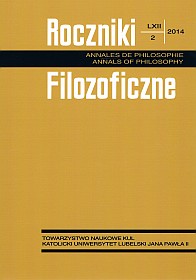Thomas Aquinas’ Metaphysics of Creation as Relation
Abstract
The concept of creation in the tradition of human thought was investigated in the theological perspective—to explain the article of faith about the origin and God-world relation. Recently, the understanding of the issue has often been dominated by an ideologically based dispute between so called creationism and evolutionism.
In his theory of creation (mostly contained in De Potentia, Summa contra Gentiles and Summa Theologica), Thomas Aquinas uses strictly philosophical instruments to analyze the problem. It allows to treat the issue of creation as a detailed explanation of the metaphysical causation theory. Furthermore, it lets us define the nature of relation between the Creator as the First Cause and the world—the set of created beings.
The concept of creation is therefore a metaphysical explanation of ontic pluralism and contingency, that is, the existence of many beings (more than one) which do not have the necessity of existence. Creation is a way of explanation how the First Cause acts, which results in the existence of numerous accidental beings. It is not a transformation or a creation of something on the basis of previous elements. It is a production in being with no previous conditions (creatio ex nihilo). The formal end of the creative action is the act of existence of accidental beings.
The creation of accidental beings generates a mutual relation of the Creator and the created beings. For the Creator (creatio activa), the creation is his own nature (Subsistent Existence) in its relation to the created beings. Such a connection has a feature of a mental relation, as practically it is not different from the nature of the Creator. For the created beings the creation (creatio passiva) is a real dependence in existence of the created beings on the Creator. This relation is a real accident, inherent in every created being, which means it is a predicable relation in the category of property (proprium).
References
Bomert Zbigniew: Wprowadzenie do artykułu 10. Czy Bóg jest realnie w relacji do stworzenia tak, że ta relacja jest w nim jakąś rzeczą, [w:] Św. Tomasz z Akwinu, Kwestie Dyskutowane. O mocy Boga, (przekład zbiorowy), t. IV, Kęty–Warszawa: Wyd. Marek Derewiecki – Instytut Tomistyczny 2010.
Emery Gilles: La relation de creation, „Nova et Vetera” (Fribourg) 88 (2013), nr 1.
Faust August: Der Möglichkeitsgedanke. Systemgeschichtliche Untersuchungen, t. II, Heidelberg: C. Winter 1932.
Gilson Étienne: Tomizm. Wprowadzenie do filozofii św. Tomasza z Akwinu, tł. J. Rybałt, Warszawa: IW PAX 1960.
Heller Michał, Pabjan Tadeusz: Stworzenie i początek wszechświata. Teologia – Filozofia – Kosmologia, Kraków: Copernicus Center Press 2013.
Heller Michał: Filozofia przypadku. Kosmiczna fuga z preludium i codą, Kraków: Copernicus Center Press 2012.
Kemp Kenneth W.: Ewolucja i stworzenie, [w:] Ewolucjonizm czy kreacjonizm, red. Piotr Jaroszyński [i in.], Lublin: Fundacja „Lubelska Szkoła Filozofii Chrześcijańskiej” 2008
Krąpiec Mieczysław Albert: Metafizyka. Zarys teorii bytu, Lublin: RW KUL 19843.
Maryniarczyk Andrzej: Dlaczego kreacjonizm, [w:] Ewolucjonizm czy kreacjonizm, red. Piotr Jaroszyński [i in.], Lublin: Fundacja „Lubelska Szkoła Filozofii Chrześcijańskiej” 2008.
Olszewski Mikołaj: Wprowadzenie do kwestii III. Stworzenie i stworzenia, [w:] Św. Tomasz z Akwinu, Kwestie Dyskutowane. O mocy Boga, (przekład zbiorowy), t. II, Kęty–Warszawa: Wyd. Marek Derewiecki – Instytut Tomistyczny 2009.
Paluch Michał: Dlaczego Tomasz?, Warszawa: Instytut Tomistyczny 2012.
Paluch Michał: Stworzenie z niczego, [w:] Św. Tomasz z Akwinu, Kwestie Dyskutowane. O mocy Boga, (przekład zbiorowy), t. II, Kęty–Warszawa: Wyd. Marek Derewiecki – Instytut Tomistyczny 2009.
Przanowski Mateusz: Wprowadzenie do artykułu 9. Czy relacje między stworzeniami a Bogiem są realnie w tych stworzeniach, [w:] Św. Tomasz z Akwinu, Kwestie Dyskutowane. O mocy Boga (przekład zbiorowy), t. IV, Kęty–Warszawa: Wyd. Marek Derewiecki – Instytut Tomistyczny 2010.
Życiński Józef: Bóg i ewolucja. Podstawowe pytania ewolucjonizmu chrześcijańskiego, Lublin: TN KUL 2002.
Copyright (c) 2014 Roczniki Filozoficzne

This work is licensed under a Creative Commons Attribution-NonCommercial-NoDerivatives 4.0 International License.





